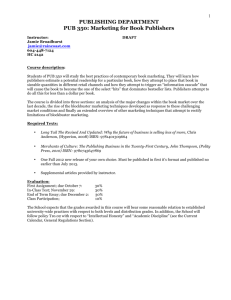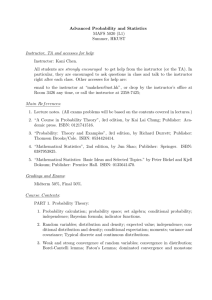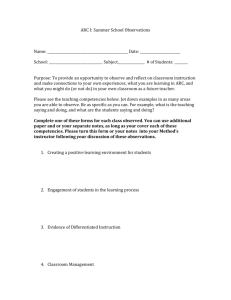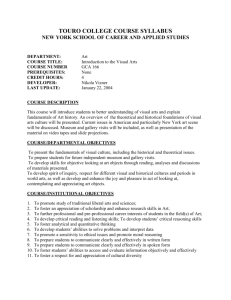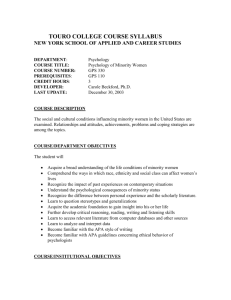MCO.260 - Touro College
advertisement
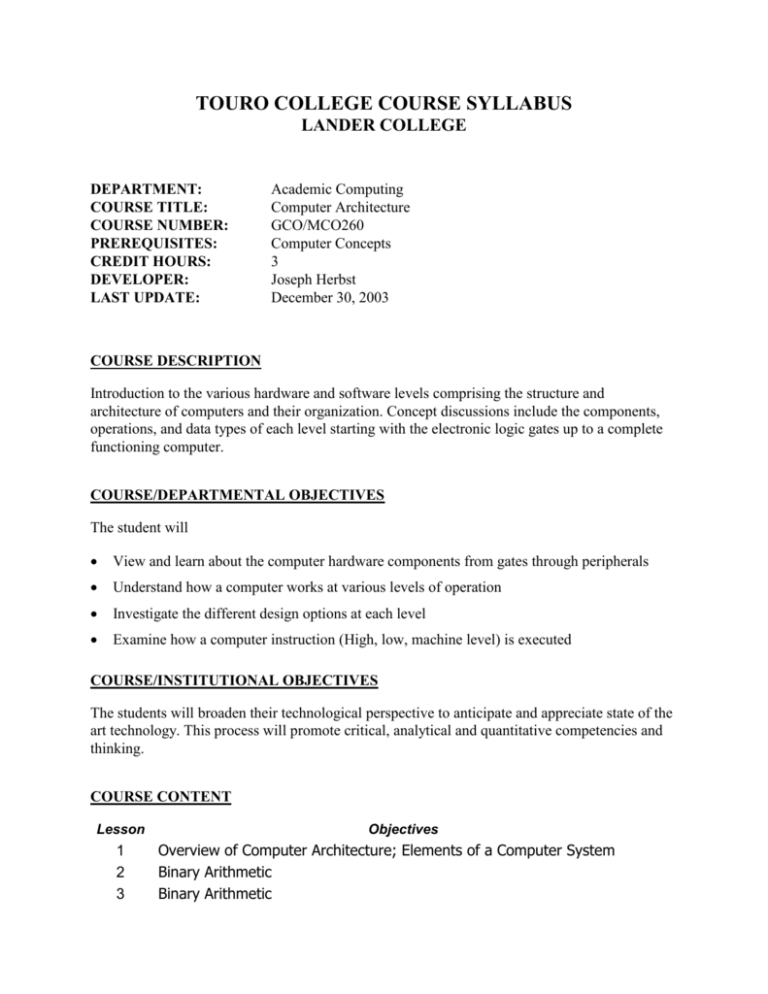
TOURO COLLEGE COURSE SYLLABUS LANDER COLLEGE DEPARTMENT: COURSE TITLE: COURSE NUMBER: PREREQUISITES: CREDIT HOURS: DEVELOPER: LAST UPDATE: Academic Computing Computer Architecture GCO/MCO260 Computer Concepts 3 Joseph Herbst December 30, 2003 COURSE DESCRIPTION Introduction to the various hardware and software levels comprising the structure and architecture of computers and their organization. Concept discussions include the components, operations, and data types of each level starting with the electronic logic gates up to a complete functioning computer. COURSE/DEPARTMENTAL OBJECTIVES The student will View and learn about the computer hardware components from gates through peripherals Understand how a computer works at various levels of operation Investigate the different design options at each level Examine how a computer instruction (High, low, machine level) is executed COURSE/INSTITUTIONAL OBJECTIVES The students will broaden their technological perspective to anticipate and appreciate state of the art technology. This process will promote critical, analytical and quantitative competencies and thinking. COURSE CONTENT Lesson 1 2 3 Objectives Overview of Computer Architecture; Elements of a Computer System Binary Arithmetic Binary Arithmetic 4 5 6 7 8 9 10 11 12 13 14 Digital Electronics: Gates and Boolean Algebra Logic Circuits Processors, Memory, I/O Devices Processors, Memory, I/O Devices Microprocessors, Buses Microarchitecture Macroarchitecture Microprograms Machine Level Architecture Machine Level Architecture Final Exam on Entire Course Material test test HARDWARE/SOFTWARE/MATERIALS REQUIREMENTS: No specific hardware or software is required. Optionally if time allows some circuits can be demonstrated using MultiSim electronic simulator as well as the 809 trainer board kit. COURSE REQUIREMENTS The course is very heavily based upon the class lectures. In addition there will be reading material assigned from the text and handouts. Homework will be given weekly and reviewed after a week's time. Attendance is important as well as class participation. There will be two examinations in addition to the final exam. There is an optional project and a series of quizzes. GRADING GUIDELINES The grades are based primarily upon the exams 50%, Final 30%, Homework and class participation 15%. The overall participation in class as well as diligence in following up on specific advanced topics is a strong overriding factor for the grade as well METHODOLOGY The Instructor should discuss and present the current lesson using a white board, a computer with a large monitor/projector, and written handouts. The material should be presented in heuristic manner since the overall majority of students are not required to have an advanced mathematical or scientific background. At the end of the current class, the Instructor should assign and explain the homework assignment consisting of pages to be read in the textbook and review questions at the end of the 2 chapter (in the textbook). Assignments should be written and submitted at the beginning of the next class. The Instructor will grade all submitted assignments, and either review or attach answer keys. During the following class, the Instructor will orally review questions (as necessary) from the previous class' assignments. Students are required to complete and submit all assignments by the due date indicated by the Instructor. COURSE TEXT(S) Title: Author: Pub. Date: Publisher: ISBN #: Digital Systems: Priciples and Applications 8th/9th Edition Tocci, Widmer 2001/2004 Prentice Hall 0-13-085634-7 /0-13=111120-5 BIBLIOGRAPHY Title: Author: Pub. Date: Publisher: ISBN #: Digital Principles, Schaum's OutLines, 3rd Edition Roger L.Tokheim Title: Author: Pub. Date: Publisher: Structured Computer Organization, 3rd Edition Andrew S. Tanenbaum [Click & type/Double-click to paste pub. date - ex. "Jan. 2003"] Prentice Hall McGraw Hill 0-07-065050-0 RELATED WEB SITES None other than those associated with the texts. ATTENDANCE & MAKE-UP POLICIES Attendance and class participation are important. Much of the lecture is tailored to the student material and is backed up by text. If a student knows that a class will be missed, one should contact a classmate and get as much of the lecture ASAP. Should a student miss an exam, it usually can be made up within one week. No makeup test can be given once the test has been graded, returned and reviewed. HOMEWORK ASSIGNMENTS 3 Homework will be assigned as the class progresses. Since the lectures evolve in a structured the homework will be based upon the competencies developed and grasped during the lecture. Some formal questions from the text will also be assigned. ENTRANCE COMPETENCIES The student should be in their second year with a basic competence level at computer operations and good computer literacy. They should be ready to do a fair amount of work at their own initiative. Some level of math and logic skills is required. Some technical knowledge would be helpful but is not required COURSE EXPECTATIONS The student should expect to learn the basic components and operations of a computer system. Basic understanding of computer organization and its relationship to software and hardware operations will also develop. EXIT COMPETENCIES The student will also develop the ability to understand advanced computer technological concepts that they may encounter once out in industry. For Computer Science majors, the student will be able to fully grasp the operations and programming requirements for Advanced programming and assembly language programming as well as refined analytical computer methods. For Data Communications and MIS majors , the student will be in a better position to understand the technological issues in providing system level solutions and integration. 4 TOURO COLLEGE COURSE SYLLABUS LANDER COLLEGE DEPARTMENT: COURSE TITLE: COURSE NUMBER: PREREQUISITES: CREDIT HOURS: DEVELOPER: LAST UPDATE: Academic Computing Computer Architecture GCO/MCO260 Computer Concepts 3 Joseph Herbst December 30, 2003 CLASS INFORMATION CLASS CODE: SCHEDULE: LOCATION: FINAL EXAM DATE: GCO260-YM Sunday 10:00 AM – 12:20 PM 1401 Kings Highway 6-Jun INSTRUCTOR CONTACT INFORMATION Instructor Name: Email Address: Contact Phone: Office Location/Hours: Joseph Herbst jherbst3@netzero.net [Put in INSTRUCTOR contact/dept phone here.] Avenue J Campus, Mon, Wed 8:10-9:15 COURSE DESCRIPTION Introduction to the various hardware and software levels comprising the structure and architecture of computers and their organization. Concept discussions include the components, operations, and data types of each level starting with the electronic logic gates up to a complete functioning computer. COURSE/DEPARTMENTAL OBJECTIVES The student will View and learn about the computer hardware components from gates through peripherals Understand how a computer works at various levels of operation Investigate the different design options at each level Examine how a computer instruction (High, low, machine level) is executed COURSE TEXT(S) 1 Title: Author: Pub. Date: Publisher: ISBN #: Digital Systems: Priciples and Applications 8th/9th Edition Tocci, Widmer 2001/2004 Prentice Hall 0-13-085634-7 /0-13=111120-5 BIBLIOGRAPHY Title: Author: Pub. Date: Publisher: ISBN #: Digital Principles, Schaum's OutLines, 3rd Edition Roger L.Tokheim Title: Author: Pub. Date: Publisher: Structured Computer Organization, 3rd Edition Andrew S. Tanenbaum [Click & type/Double-click to paste pub. date - ex. "Jan. 2003"] Prentice Hall McGraw Hill 0-07-065050-0 COURSE CONTENT Week of Lesson 8-Feb 1 Objectives Overview of Computer Architecture; Elements of a Computer System No Class 15-Feb 22-Feb 2 Binary Arithmetic 29-Feb 3 Binary Arithmetic No Class 7-Mar 14-Mar 4 Digital Electronics: Gates and Boolean Algebra 21-Mar 5 Logic Circuits 28-Mar 6 Processors, Memory, I/O Devices 4-Apr 7 Processors, Memory, I/O Devices No Class 11-Apr 18-Apr 8 Microprocessors, Buses 25-Apr 9 Microarchitecture 2-May 10 Macroarchitecture 9-May 11 Microprograms 16-May 12 Machine Level Architecture 23-May 13 Machine Level Architecture 30-May 10 No Class 6-Jun 14 Final Exam on Entire Course Material 2 ATTENDANCE & MAKE-UP POLICIES Attendance and class participation are important. Much of the lecture is tailored to the student material and is backed up by text. If a student knows that a class will be missed, one should contact a classmate and get as much of the lecture ASAP. Should a student miss an exam, it usually can be made up within one week. No makeup test can be given once the test has been graded, returned and reviewed. HOMEWORK ASSIGNMENTS Homework will be assigned as the class progresses. Since the lectures evolve in a structured the homework will be based upon the competencies developed and grasped during the lecture. Some formal questions from the text will also be assigned. ENTRANCE COMPETENCIES The student should be in their second year with a basic competence level at computer operations and good computer literacy. They should be ready to do a fair amount of work at their own initiative. Some level of math and logic skills is required. Some technical knowledge would be helpful but is not required COURSE EXPECTATIONS The student should expect to learn the basic components and operations of a computer system. Basic understanding of computer organization and its relationship to software and hardware operations will also develop. EXIT COMPETENCIES The student will also develop the ability to understand advanced computer technological concepts that they may encounter once out in industry. For Computer Science majors, the student will be able to fully grasp the operations and programming requirements for Advanced programming and assembly language programming as well as refined analytical computer methods. For Data Communications and MIS majors , the student will be in a better position to understand the technological issues in providing system level solutions and integration. 3
